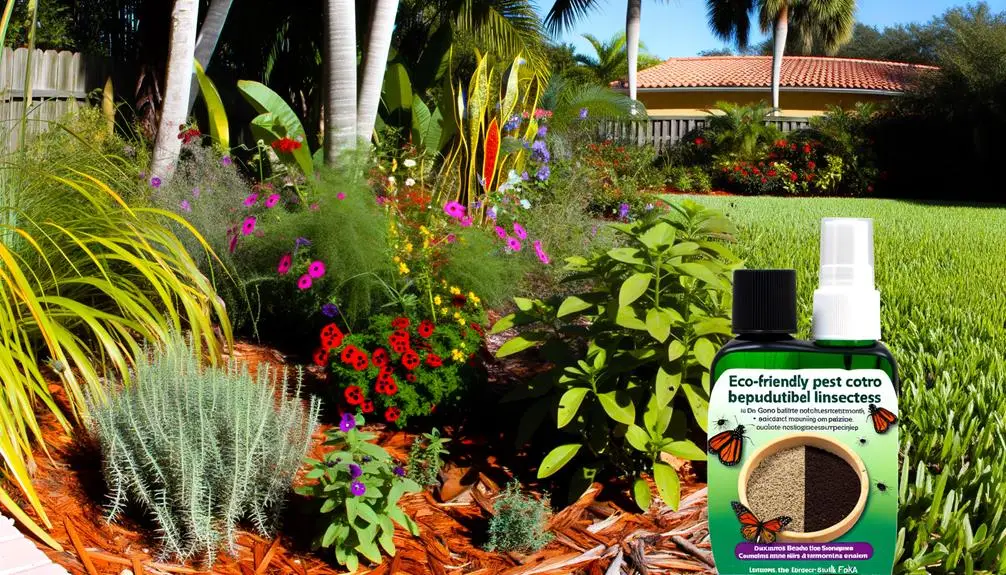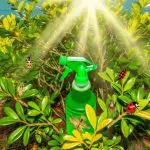To protect your South Florida garden from pests effectively, consider using natural methods like Integrated Pest Management (IPM). This approach encourages monitoring and supports beneficial insects, like ladybugs, to naturally control harmful pests. You can try organic options like neem oil or diatomaceous earth, both secure for your plants and the environment. Companion planting also enhances garden health by deterring pests. Don’t forget to implement preventive measures, ensuring your garden thrives. Explore further strategies and products that can keep your garden pest-free while being eco-friendly! Additionally, using natural oils for pest control can be an excellent way to target specific pests while remaining safe for pollinators and other beneficial creatures. Oils such as peppermint, rosemary, and citrus are known to repel insects while adding a pleasant aroma to your garden. Combining these natural techniques will create a well-rounded, sustainable approach, giving your South Florida garden the protection it needs without compromising the environment.
Key Takeaways
- Utilize Integrated Pest Management (IPM) strategies for sustainable pest control, focusing on monitoring and early identification of pest issues in South Florida gardens.
- Encourage beneficial insects like ladybugs and lacewings to naturally manage harmful pest populations in your garden.
- Apply organic neem oil and insecticidal soaps to effectively target pests like aphids and spider mites while being safe for the environment.
- Implement companion planting by pairing plants that repel pests, such as marigolds and basil, to enhance biodiversity and garden health.
- Regularly monitor and maintain a diverse ecosystem in your garden to prevent pest infestations and support overall plant resilience in South Florida.
Integrated Pest Management (IPM)
Integrated Pest Management (IPM) is your go-to strategy for keeping pests in check while promoting a healthy garden ecosystem. By embracing IPM, you’re not just battling pests; you’re fostering a balanced environment where plants can thrive. This holistic approach focuses on long-term pest prevention through thorough monitoring and early identification of pest populations. Effective pest control is achieved through safety-first approaches, ensuring you can manage pests without compromising your garden’s health or security.
You’ll use a variety of natural pest control methods, combining mechanical, cultural, and biological control techniques. Encouraging beneficial insects like ladybugs and lacewings is a key aspect of IPM. These little helpers prey on harmful pests, naturally keeping their numbers down and reducing the risk of infestations in your garden. Community awareness increases demand for sustainable pest control, which can support your IPM efforts.
Regular monitoring is essential. By keeping an eye on pest populations, you can intervene before problems escalate. This proactive approach allows you to tackle issues calmly and effectively, ensuring your garden remains a vibrant space. Additionally, IPM minimizes the reliance on chemical pesticides, which not only protects the environment but also shields your health and that of your loved ones.
Organic Neem Oil
Organic neem oil is a powerful ally in your garden, providing an effective natural insecticide against a variety of pests like aphids and spider mites. Derived from the seeds of the neem tree, this oil contains azadirachtin, a key compound that disrupts insect life cycles by inhibiting reproduction and growth. It’s a game-changer for those of you committed to organic gardening.
To incorporate organic neem oil into your routine, mix 1-2 tablespoons with 1 gallon of water, and spray it on the undersides of leaves, particularly where pests are prevalent. It’s harmless for vegetables, fruits, and flowers, and when applied properly, it doesn’t harm beneficial insects. Just remember to reapply every 7-14 days or after heavy rain, and aim for early morning or late evening for ideal results.
Here’s a quick overview of neem oil’s benefits:
| Benefit | Description | Application Tips |
|---|---|---|
| Effective Pest Control | Targets aphids, whiteflies, and spider mites | Spray on affected areas |
| Harmless for Beneficial Insects | Doesn’t harm pollinators when used correctly | Apply in the morning or evening |
| Long-lasting Effects | Reapplies every 7-14 days for continued protection | Mix with water for easy application |
Using organic neem oil can help create a thriving ecosystem in your garden, ensuring that it remains vibrant and productive while you share this journey with fellow gardening enthusiasts.
Diatomaceous Earth
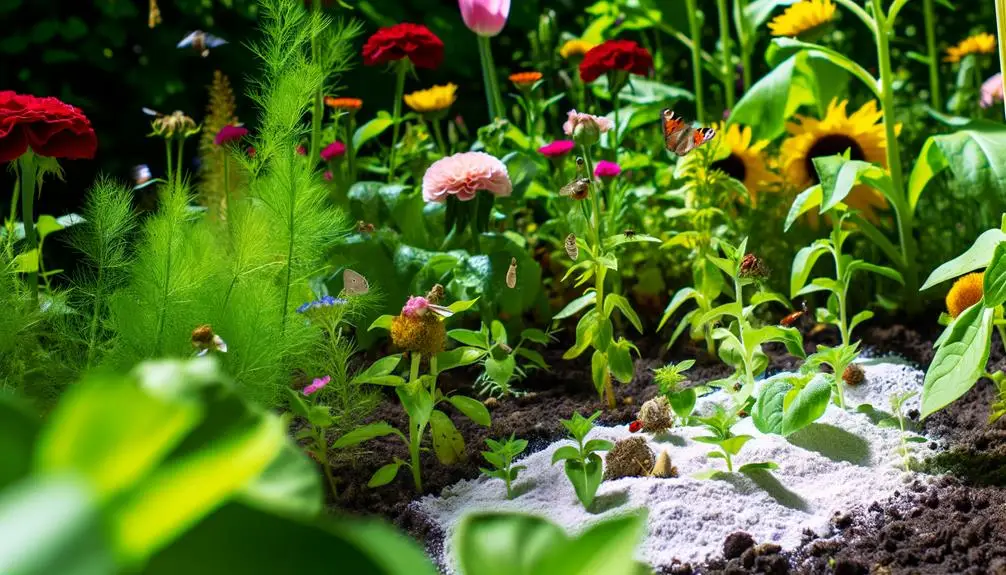
Another effective method for controlling pests in your garden is diatomaceous earth (DE). This natural powder, made from the fossilized remains of tiny aquatic organisms called diatoms, is a game changer for eco-friendly gardening. When you sprinkle DE around your plants or directly onto soft-bodied insects like slugs, snails, and caterpillars, it creates a physical barrier that disrupts their exoskeletons. This process leads to dehydration and ultimately, their demise, all without harming the environment. Additionally, using natural options for fertilizing can complement the benefits of diatomaceous earth, promoting overall plant health.
What’s great about diatomaceous earth is that it’s harmless for humans and pets. You can confidently use it in your garden, knowing you’re opting for a non-toxic solution that aligns with your values of natural pest control. However, keep in mind that DE is most effective when applied in dry conditions. Moisture can reduce its pest-fighting prowess, so make sure to reapply it after rainfall or heavy watering.
Using diatomaceous earth not only helps keep troublesome insects at bay but also enhances your soil health by adding beneficial minerals. This promotes healthier plant growth, creating a thriving garden that you can be proud of. By incorporating DE into your gardening routine, you’ll be joining a community of eco-conscious gardeners who prioritize natural methods for pest control. So, why not give diatomaceous earth a try? Your garden will thank you!
Companion Planting
Companion planting is an effective strategy for enhancing your garden’s health and resilience. By strategically growing different plants together, you can create a natural habitat that not only deters garden pests but also boosts biodiversity. For instance, planting marigolds can repel nematodes, while basil helps ward off mosquitoes and flies. This approach fosters a balanced ecosystem, making your garden more robust and less reliant on chemical interventions. Additionally, certain combinations can help reduce infestations of common pests like aphids and whiteflies, which are prevalent in South Florida gardens common pests in South Florida.
One of the greatest benefits of companion planting is its ability to attract beneficial insects. When you plant dill near cabbage, you invite predatory wasps that naturally control cabbage worms. These tiny allies play a vital role in maintaining your garden’s health, acting as a form of natural pest control. The more diverse your garden, the more resilient it becomes against various pests.
Moreover, certain plants, like legumes, can improve soil health by fixing nitrogen, which benefits neighboring plants. This synergy not only enhances nutrient uptake but also promotes a thriving garden environment.
Citrus Oils

Citrus oils, derived from the peels of fruits like lemons and oranges, offer a powerful yet reliable solution for managing pests in your garden. If you’re into organic gardening, these natural methods can greatly enhance your pest control solutions. NaturePest, a family-owned and operated holistic pest control service, emphasizes the importance of using organic methods, making citrus oils an excellent choice for your green space. Citrus oils, such as limonene and linalool, act as effective insecticides that are harmless for both mammals and beneficial insects, making them an excellent choice for your green space.
These oils work by suffocating small, soft-bodied insects like aphids and mites, disrupting their cell membranes and leading to pest elimination. One of the best parts? Citrus oils have no residual effects, meaning they don’t linger in the environment. This sustainability makes them a smart option for any responsible gardener. Plus, they break down quickly in sunlight, so you won’t have to worry about long-term ecological impacts.
Using citrus oils as part of your pest control strategy not only protects your plants but also promotes a balanced ecosystem, aligning with practices like those of NaturePest’s organic pest control. You can feel good about using these natural insecticides, knowing they contribute positively to your garden’s health. So, next time you spot an unwelcome pest, consider reaching for citrus oils. They’re not just a remedy; they’re a reflection of your commitment to organic gardening and sustainable practices. Embracing these natural methods can help you cultivate a thriving garden that’s both beautiful and pest-free.
Insecticidal Soap
When dealing with troublesome soft-bodied insects like aphids and spider mites, you can count on insecticidal soap to step in and save the day. This non-toxic, biodegradable solution is made from potassium salts of fatty acids, making it a fantastic choice for your organic gardening efforts. It works by suffocating those annoying pests, and the best part is that it’s secure for a variety of plants, including your beloved vegetables and flowers.
To create your own insecticidal soap spray, mix 2.5-5 tablespoons of soap concentrate with 1 gallon of water. Make sure to thoroughly wet the affected plants, as effective pest control relies on direct contact with those soft-bodied insects. For best results, apply the solution during the cooler parts of the day and remember to reapply every 4-7 days, especially after a rainfall, to keep your garden protected.
If you’re new to organic gardening or pest control, don’t worry! Many gardeners in South Florida have found success with this simple method. It’s an excellent addition to your pest control services, allowing you to maintain a healthy garden while minimizing chemical use. So gather your supplies and get ready to take back your garden with insecticidal soap—your plants will thank you for it!
Plant Extracts
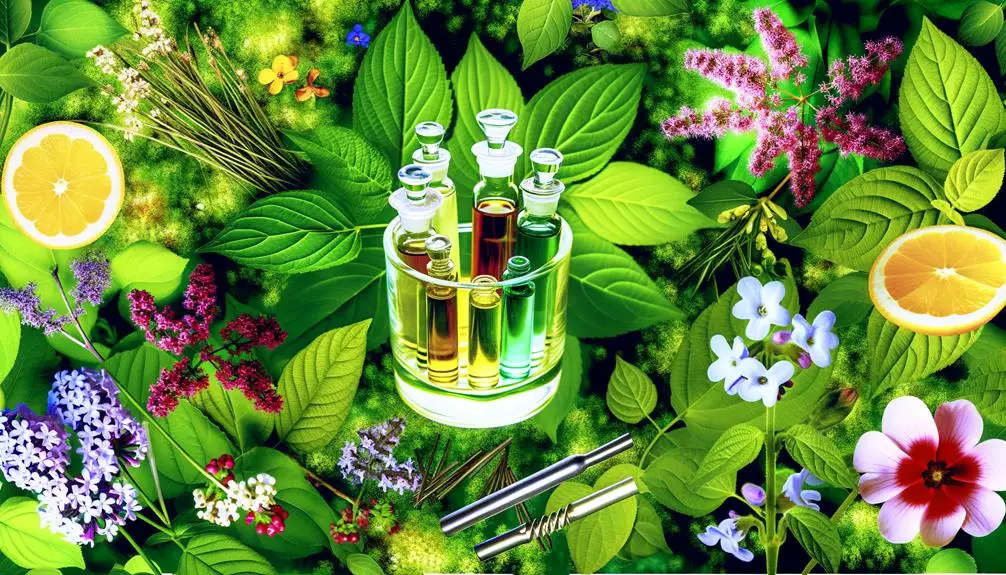
Plant extracts offer a powerful arsenal for natural pest control in your garden. These eco-friendly solutions, including neem oil, horticultural oil, and insecticidal soaps, can help you maintain a thriving organic plant environment while keeping pests at bay.
Neem oil, derived from the seeds of the neem tree, is particularly effective. It contains azadirachtin, which disrupts the life cycle of pests like aphids and spider mites. You’ll appreciate how neem oil provides a long-lasting defense against infestations without harming beneficial organisms.
Horticultural oils, made from plant extracts, are another fantastic choice. They work by suffocating soft-bodied insects like aphids and whiteflies, breaking down their cell membranes. Plus, these oils leave no harmful residues behind, making them non-toxic for your garden.
Don’t overlook insecticidal soaps either! Composed of potassium salts of fatty acids, they’re biodegradable and effectively suffocate pests. They’re especially useful for managing aphid populations, ensuring your plants remain healthy and vibrant.
Mineral Insecticides
Mineral insecticides, like diatomaceous earth, offer an effective and eco-friendly solution for managing pests in your garden. These natural pest control methods are especially useful for tackling soft-bodied pests such as slugs and caterpillars. When you apply diatomaceous earth directly to your plants or around garden areas, it works by dehydrating these pests, leaving your plants secure and flourishing. Plus, since mineral insecticides are made from fossilized diatom remains, they’re suitable for organic gardening and won’t harm beneficial insects.
Here’s a quick comparison to help you understand the benefits of mineral insecticides:
| Type | Pros | Cons |
|---|---|---|
| Diatomaceous Earth | Non-toxic, suitable for beneficial insects | Needs reapplication after rain |
| Other Mineral Insect. | Effective barrier against pests | May require consistent use |
| Organic Alternatives | Supports sustainable practices | Might be slower acting |
| Companion Planting | Enhances garden ecosystem | Requires planning and variety |
To maximize the effectiveness of mineral insecticides, remember to reapply after rain or watering. They work best when combined with other natural pest control strategies, such as companion planting and introducing beneficial insects. By embracing these methods, you’re creating a resilient garden that not only protects itself but also fosters a sense of community among fellow gardeners aiming for sustainable practices. So, gear up and let mineral insecticides help you cultivate a healthy, flourishing garden!
Microbial Insecticides
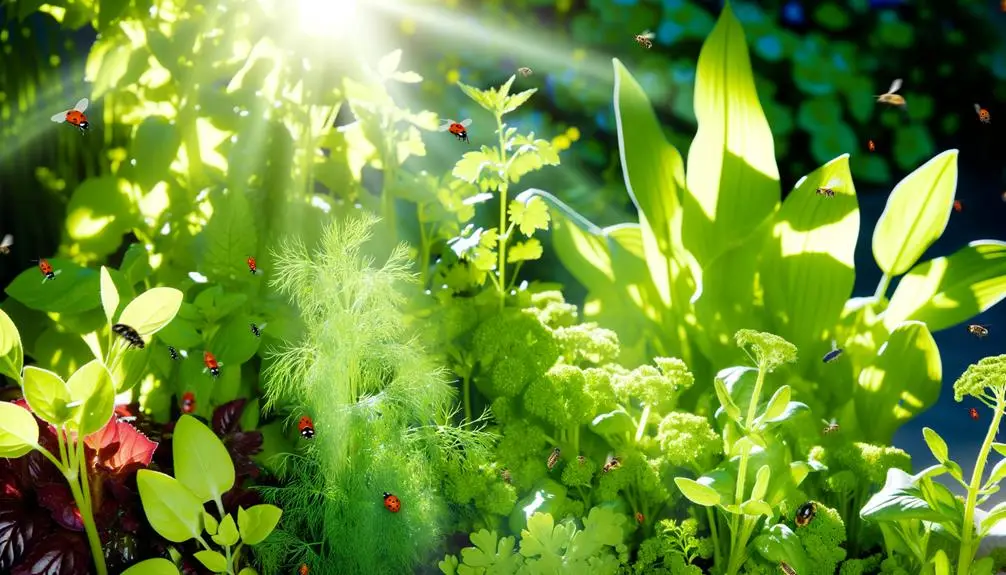
Microbial insecticides offer a powerful yet secure option for tackling garden pests without harming beneficial insects. If you’re passionate about organic gardening, these natural products can be game-changers in your pest control strategy. For instance, Bacillus thuringiensis (Bt) targets specific insect larvae, like caterpillars and mosquito larvae, effectively eliminating them while leaving your helpful pollinators unscathed.
Spinosad, derived from the soil bacterium Saccharopolyspora spinosa, is another fantastic choice. It controls a wide range of pests, including thrips and fruit flies, yet poses low toxicity risks to non-target organisms. This makes it perfect for those endeavoring to maintain a balanced garden ecosystem. You’ll love knowing that other microbial insecticides, such as Chromobacterium subtsugae and Burkholderia spp., also provide effective pest control without jeopardizing your beneficial insects.
Using microbial insecticides means you’re opting for a targeted approach that minimizes collateral damage. You’ll be reducing your reliance on chemical pesticides, promoting sustainable pest management practices that align with your values. By choosing these natural products, you’re not just protecting your garden; you’re joining a community of gardeners committed to nurturing their plants and the environment. These environmentally friendly solutions work in harmony with nature, preserving beneficial insects and the overall health of your soil. While some may wonder, are organic pesticides safe, it’s important to note that microbial insecticides are derived from naturally occurring organisms, making them a safer alternative for both humans and wildlife. By integrating these thoughtful choices into your gardening routine, you’re fostering a healthier ecosystem and ensuring long-term resilience for your plants.
Embrace microbial insecticides as part of your organic gardening toolkit, and you’ll cultivate a healthier garden that thrives while respecting nature’s delicate balance. You’re part of a bigger movement toward responsible gardening, and every choice counts!
Disease Management
Managing diseases in your garden starts with fostering healthy, resilient plants that can withstand infections. When you focus on cultivating these strong plants, you greatly reduce the likelihood of plant diseases taking hold. This is where effective disease management becomes essential. By implementing integrated pest management (IPM) strategies, you combine cultural, physical, and biological controls, creating a balanced ecosystem that supports overall plant health.
Regular monitoring of your plants is key. Keep an eye out for any signs of distress or infection, and remove any infected plants promptly to prevent the spread of disease. While limited natural fungicides are available, early detection is your best defense. Consider incorporating natural pest control methods, such as companion planting with pest-repelling varieties like marigolds and basil, which can enhance the resilience of your garden.
Additionally, explore options like baculoviruses for managing specific plant diseases. These biological controls can be a valuable part of your disease management toolkit. Remember, maintaining a diverse ecosystem not only enhances plant health but also reduces susceptibility to diseases, creating a thriving garden environment.
Ultimately, by fostering healthy and resistant plants and using IPM techniques, you can cultivate a garden that’s not just beautiful but also resilient against diseases. Embrace these practices, and you’ll feel a sense of belonging in the community of gardeners dedicated to sustainable and effective garden care.
Preventive Garden Tips
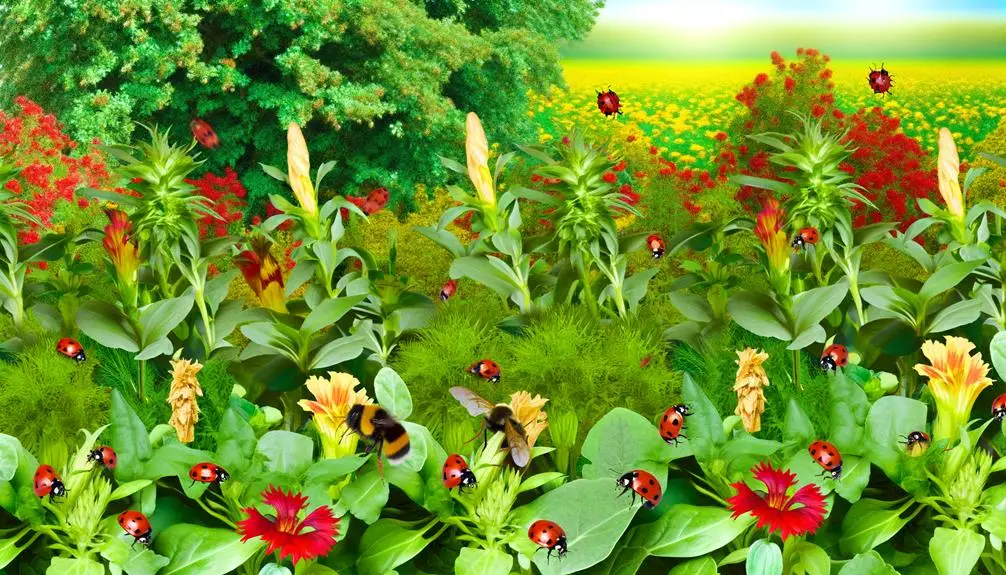
Fostering healthy plants and employing integrated pest management techniques lays a solid foundation for your garden’s success. By adopting preventive garden tips, you can minimize pest issues and create a thriving ecosystem. Here are some effective strategies:
| Tip | Description | Benefits |
|---|---|---|
| Regular Monitoring | Check for early signs of pests weekly | Catch problems early, reduce interventions |
| Companion Planting | Grow pest-repelling plants like marigolds | Natural barriers against pests |
| Encourage Beneficial Insects | Provide habitats for ladybugs and lacewings | Enhance natural pest control |
| Healthy Soil Maintenance | Use compost and mulch to enrich the soil | Support robust plant resilience |
By integrating these natural pest control methods into your routine, you’ll promote a healthier garden environment. Regularly monitoring your plants helps you identify issues before they escalate. Companion planting not only beautifies your space but also acts as a defense mechanism.
Encouraging beneficial insects is essential; by creating diverse habitats, you invite natural predators to help manage pest levels. Plus, maintaining healthy soil through organic practices strengthens your plants, making them less vulnerable to infestations.
Lastly, consider using physical barriers like row covers to protect your vulnerable plants while still allowing light and moisture to penetrate. By implementing these preventive garden tips, you’re not just fighting pests; you’re nurturing a vibrant, resilient garden community.
Professional Pest Control
When it comes to maintaining a healthy garden, professional pest control services offer expertise and tailored solutions that can make a significant difference. You want your garden to thrive, and that’s where these professionals come in. They start with initial inspections to assess pest issues and create customized treatment plans that specifically address your garden’s needs.
One of the primary approaches used by these experts is Integrated Pest Management (IPM), a holistic strategy that emphasizes long-term pest prevention. By monitoring pest populations and employing eco-friendly techniques, they can disrupt pest life cycles while reducing reliance on chemicals. This not only protects your plants but also supports the health of beneficial insects like ladybugs, which play a vital role in pest control.
You’ll appreciate that professional pest control services focus on non-toxic chemical treatments that are effective yet gentle on your garden’s ecosystem. With follow-up visits, they guarantee ongoing monitoring, allowing for adjustments to treatment plans as necessary. This commitment to maintaining your garden’s health fosters a sense of community, as you join others who prioritize eco-friendly gardening practices.
Local Pest Control Services
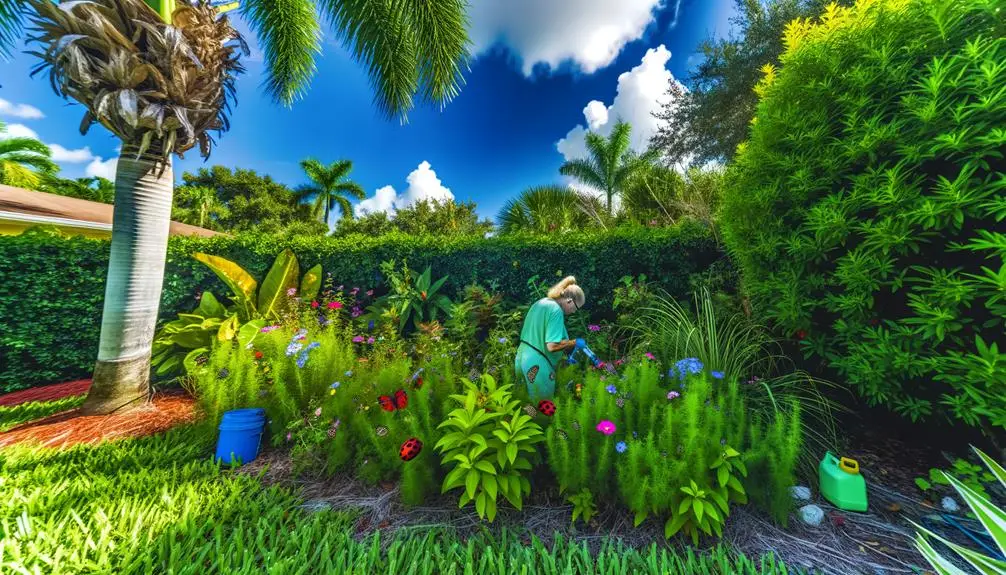
Local pest management services are vital for maintaining a healthy garden, especially in South Florida’s unique climate. You know how challenging it can be to keep pests at bay, but with the right help, you can enjoy a thriving garden. NaturePest, a family-owned company, offers holistic pest control solutions tailored to your specific needs. Their commitment to organic methods means you can protect your plants without harmful chemicals, creating a more secure environment for your family and pets.
NaturePest uses integrated pest management (IPM) strategies, focusing on long-term prevention. This approach minimizes chemical applications while encouraging beneficial insects to flourish in your garden. Whether you’re dealing with bothersome aphids, roaches, or mosquitoes, you can trust their Pest Free Guarantee to deliver effective results. Their organic compliant treatments for ant control and rodent issues guarantee your garden remains healthy and vibrant.
With flexible scheduling from Sunday to Friday, NaturePest makes it easy for you to get the assistance you need, even on short notice. You don’t have to struggle alone with pest control; their experienced team is ready to tackle your garden’s unique challenges. By choosing local pest management services like NaturePest, you’re not just protecting your garden; you’re joining a community that values sustainable practices and a healthier environment. Together, you can create a resilient garden that thrives in South Florida’s vibrant ecosystem.
Frequently Asked Questions
What Is a Natural Spray to Keep Bugs Away From Garden?
To keep bugs away from your garden, you can whip up a natural spray using neem oil. Just mix 1-2 tablespoons of neem oil with a gallon of water and spray it on affected plants. It’s effective against common pests like aphids and spider mites. You might also consider adding essential oils, like peppermint, for extra protection. These natural solutions not only protect your plants but also contribute to a healthier garden ecosystem.
What Can I Put on My Vegetable Plants to Keep Bugs Off?
Imagine your vegetable garden as a fortress, and you’re the guardian. To keep pests at bay, try using neem oil mixed with water—it’s like a shield that disrupts their life cycles. Alternatively, sprinkle diatomaceous earth around your plants; think of it as a moat that dehydrates invaders. You might also plant marigolds nearby, adding allies to your garden. These natural methods create a thriving ecosystem where your veggies can flourish, protected from unwanted guests.
What Is the Most Powerful Natural Insecticide?
When you’re looking for the most powerful natural insecticide, consider neem oil. It disrupts pest life cycles and targets a variety of insects. You might also try insecticidal soaps, which suffocate soft-bodied pests on contact. Bacillus thuringiensis (Bt) is another great option if you’re dealing with caterpillars. Each of these methods is effective, harmless for your plants, and works to create a healthier garden environment you’ll love nurturing.
What Is a Natural Pesticide for Plants?
Imagine walking through your vibrant garden, where the scent of fresh basil mingles with the warmth of the sun. You’ve got natural pesticides like neem oil, which you can easily spray to keep annoying insects at bay. Insecticidal soaps are another great option, suffocating soft-bodied pests. And don’t forget companion planting! With marigolds and herbs, you’re not just protecting your plants; you’re creating a thriving ecosystem everyone can admire. Embrace nature’s solutions!
Create Your Own Garden Paradise
Ready to turn your garden into a thriving, pest-free sanctuary? With NaturePest Holistic Pest Control, you can embrace natural methods that not only protect your plants but cultivate an ecosystem that thrives—just like Eden. Our commitment to Integrated Pest Management, organic solutions, and companion planting ensures a healthier environment for your garden and the beneficial insects that keep it balanced.
Every action you take helps foster harmony in nature. So why wait? Let your garden flourish and become the steward of your own green paradise. Call NaturePest today and start your journey to a vibrant, eco-friendly garden!

